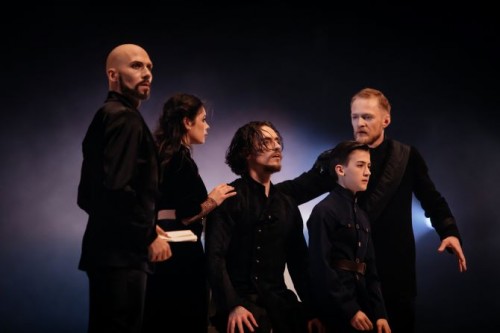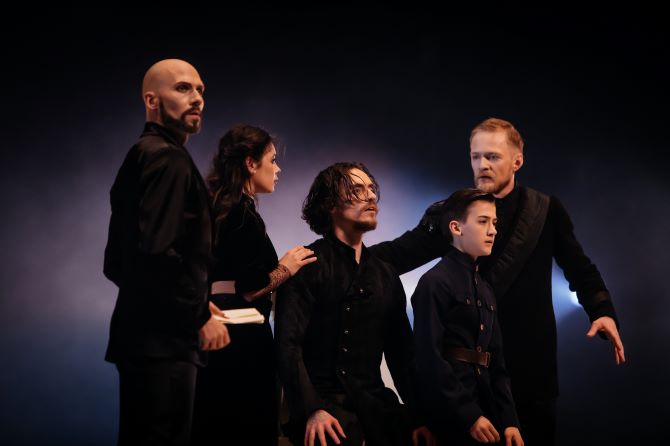 United Kingdom Sergei Polunin at the London Palladium – Rasputin: Sergei Polunin and dancers. London Palladium, 31.5.2019. (JPr)
United Kingdom Sergei Polunin at the London Palladium – Rasputin: Sergei Polunin and dancers. London Palladium, 31.5.2019. (JPr)

& Alexey Lyubimov in Rasputin (c) Vitaly Krivtsov
For a June 2021 review click here
Production:
Choreography – Yuka Oishi
Music – Kirill Richter
Set designer – Otto Bubenicek
Costume designer – Ulyana Sergeenko
Lighting designer – Konstantin Binkin
Cast:
Sergei Polunin – Grigori Rasputin
Johan Kobborg – Prince Felix Yusupov
Alexey Lyubimov – Tsar Nicholas II
Elena Ilinykh – Tsarina Alexandra Feodorovna
Djorjde Kalenic – Tsarevich Alexey
I don’t really need to rehash Sergei Polunin’s past and present that has done so much to overshadow this short London Palladium season but since it seems to be the start of an attempt at dance world redemption, I feel I must. ‘Bad boy’ antics and boredom made the prodigiously talented Polunin leave the Royal Ballet in 2012 at only 22. Subsequently ballet has seemed not as important as appearing in music videos or Hollywood films. The two worlds collided with a small part in the biopic, The White Crow, about the defection of Rudolf Nureyev, the dancer Polunin has been compared with most: in this his dancing had the élan lacking from the lead actor. Tattoos and Twitter have also caused self-inflicted problems for Polunin and so it is not a major British company that has orchestrated this return to a London stage but his own Polunin Ink. If there is anything positive to be taken from all this it is that Jonas Kobborg – the distinguished choreographer and former Royal Ballet star – appears now to have taken on a mentoring role, and only good things can come of this.
I don’t know how hastily these Palladium performances were put together but certainly this second of the two programmes was very short – although ticket prices were quite high – with barely one hour of dance interrupted by an interval. Without a break it would have proved the perfect conclusion to an evening with something else in the first half. Let me say straightaway that I have seen two ‘star vehicles’ recently for leading dancers; Sidi Larbi Cherkaoui’s Medusa for Natalia Osipova (review click here) and now Yuka Oishi’s Rasputin. It is only Rasputin I would be interested in seeing again.
On a giant chessboard on stage – with a few random large chess pieces around and about – we can appreciate the metaphor to pre-Russian Revolution politics. We see glimpses initially of a happy family with young Alexey and his parents, Tsar Nicholas II and Tsarina Alexandra, before tensions arise most notably from the Tsarevich’s haemophilia.
The CliffsNotes are well known about how Rasputin, a charismatic holy man (though some say religious charlatan), gained excessive sway in the royal household when he seemed to heal Alexey’s affliction. When the Tsar is absent from St Petersburg – overseeing Russian armies fighting in the First World War – it only increased Rasputin’s influence with Alexandra who was left in charge. However as Russian defeats and losses mounted both became increasingly unpopular. Finally, though it is still the subject of much debate, Rasputin was assassinated by a cabal including Prince Felix Yusupov and apparently demonstrated remarkable powers of survival before succumbing to poison and bullet wounds.
Oishi has said about her Rasputin how she ‘choreographed how she saw the story myself, trying to understand the feelings of each of the characters and portraying them in clear images. I wanted to show the dark beast side of Rasputin but also the light that existed in him.’ Although the Mayerling-lite narrative could be a little clearer at times this is basically what we see in the ballet’s short span. There are moments of repose in Kirill Richter’s insistent and percussive pre-recorded score, but it was over-amplified and relied too much for my liking on Boney M.’s well-known song that begins ‘Ra Rasputin’.
It is very much an ensemble piece with Djordje Kalenic extraordinarily impressive as Alexey, as was, Elena Ilinykh as Alexandra, who is equally devoted to her son and Rasputin. Johan Kobborg was outstanding as the sexually conflicted Yusupov, whose red scarf hints at the Revolution to comes and introduced the only other colour into designs that were uniformly black-and-white. Still a magnetic performer there was a palpable homoerotic frisson in the Yusupov/Rasputin duetting.
The last time I saw ballet at the London Palladium it was in August 1987 when Rudolf Nureyev danced his programme devoted to Diaghilev. Don’t believe what you may read elsewhere, Polunin danced Rasputin as if his life – and career – dependent on it. Polunin gets one especially rampant schizophrenic solo just before the needless interval as he wrestles mesmerically with his character’s demons. I haven’t seen a male dancer recently to equal Polunin’s ability and technique and the comparison to Nureyev is thoroughly deserved. Sergei Polunin’s attitude seems to be (to paraphrase Norma Desmond): ‘I am big, but it is the ballet that got small’. Kobborg’s wife is Alina Cojocaru and together with Polunin there are plans to stage a new Romeo & Juliet in Verona in August. Since Cojocaru is currently the leading ballerina of English National Ballet perhaps Tamara Rojo could bring a version to the London Coliseum in the not-too-distant future if it is as good as I suspect it might be.
The end of Rasputin brought a comfortably filled London Palladium to their feet for a standing ovation, something an open-faced and beaming Polunin obviously enjoyed.
Jim Pritchard
For more about Polunin Ink click here.

At last someone who recognises brilliance when he sees it. I wonder what Dr Pritchard would have thought about “Fraudulent Smile”, “Paradox” and “Sacré” in Program One.
Thanks, Dr. Pritchard, for your informative and insightful
review. We, too, love to see Mr. Polunin exploring and
expanding his horizon. Good to know that in ‘Rasputin’
Sergei has danced ‘as if his life and career dependent on it’.
Already holding tickets for Verona, and look forward to seeing ‘Romeo and Juliet’ in August.